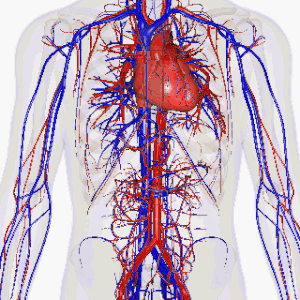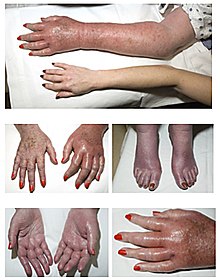Vascular disease
| Vascular disease | |
|---|---|
 | |
| Veins and arteries | |
| Specialty | Angiology |
| Types | Peripheral artery disease,[1] Renal artery stenosis[2] |
| Diagnostic method | Venography, Ultrasound[3] |
| Treatment | Quit smoking, Lower cholesterol[4] |
Vascular disease is a class of diseases of the blood vessels – the arteries and veins of the circulatory system of the body. It is a subgroup of cardiovascular disease. Disorders in this vast network of blood vessels, can cause a range of health problems which can be severe or prove fatal.[3]
Types[]
There are several types of vascular disease, (which is a subgroup of cardiovascular disease), the signs and symptoms depend on which type, among them are:[5]
- Erythromelalgia - a rare peripheral vascular disease where syndromes includes burning pain, increased temperature, erythema and swelling, of mainly the hands and feet are affected. [6]
 Erythromelalgia in a 77-year-old woman
Erythromelalgia in a 77-year-old woman - Peripheral artery disease – happens when atheromatous plaques build up in the arteries that supply blood to the arms and legs, plaque causes the arteries to narrow or become blocked.[1]
- Renal artery stenosis - is the narrowing of renal arteries that carry blood to the kidneys from the aorta.[2]
- Buerger's disease – is due to small blood vessels that inflame and swell, vessels then narrow or are blocked by blood clots.[7]
- Raynaud's disease – a rare peripheral vascular disorder of constriction of the peripheral blood vessels, in the fingers and toes when the person is cold.[8]
- Disseminated intravascular coagulation – a widespread activation of clotting in the smaller blood vessels.[9]
- Cerebrovascular disease–a group of vascular diseases that affect brain function.[citation needed]
Mechanism[]

Vascular disease is a pathological state of large and medium muscular arteries and is triggered by endothelial cell dysfunction.[10] Because of factors like pathogens, oxidized LDL particles and other inflammatory stimuli endothelial cells become active.[11] The process causes thickening of the vessel wall, forming a plaque that consists of proliferating smooth muscle cells, macrophages and lymphocytes.[12][13] The plaque results in a restricted blood flow which will decrease the amount of oxygen and nutrients that reach certain organs,[14] the plaque might rupture causing the formation of clots.
Diagnosis[]
It can be difficult to make a vascular disease diagnosis since there are a variety of symptoms that a person can have, also family history and a physical examination are important. The physical exam may be different depending on the type of vascular disease. In the case of a peripheral vascular disease the physical exam consists in checking the blood flow in the legs.[15][16]
Treatment[]

Treatment varies with the type of vascular disease; in the case of renal artery disease, information from a meta-analysis indicated that balloon angioplasty results in improvement of diastolic blood pressure and a reduction in antihypertensive drug requirements.[17] In the case of peripheral artery disease, preventing complications is important; without treatment, sores or gangrene (tissue death) may occur. Among the treatments are:[4]
- Quitting smoking
- Lowering cholesterol
- Lower blood pressure
- Lower blood glucose
- Physical activity
References[]
- ^ Jump up to: a b "Peripheral Arterial Disease: MedlinePlus". www.nlm.nih.gov. Retrieved 2015-06-23.
- ^ Jump up to: a b "Renal Artery Stenosis". www.niddk.nih.gov. Retrieved 2015-06-23.
- ^ Jump up to: a b "Vascular Diseases: MedlinePlus". www.nlm.nih.gov. Retrieved 2015-06-23.
- ^ Jump up to: a b "How Is Peripheral Arterial Disease Treated? - NHLBI, NIH". www.nhlbi.nih.gov. Retrieved 2015-06-23.
- ^ Hirsch, Alan T.; Haskal, Ziv J.; Hertzer, Norman R.; Bakal, Curtis W.; Creager, Mark A.; Halperin, Jonathan L.; Hiratzka, Loren F.; Murphy, William R.C.; Olin, Jeffrey W.; Puschett, Jules B.; Rosenfield, Kenneth A.; Sacks, David; Stanley, James C.; Taylor, Lloyd M.; White, Christopher J.; White, John; White, Rodney A.; Antman, Elliott M.; Smith, Sidney C.; Adams, Cynthia D.; Anderson, Jeffrey L.; Faxon, David P.; Fuster, Valentin; Gibbons, Raymond J.; Halperin, Jonathan L.; Hiratzka, Loren F.; Hunt, Sharon A.; Jacobs, Alice K.; Nishimura, Rick; et al. (2006). "ACC/AHA 2005 Guidelines for the Management of Patients With Peripheral Arterial Disease (Lower Extremity, Renal, Mesenteric, and Abdominal Aortic): A Collaborative Report from the American Association for Vascular Surgery/Society for Vascular Surgery,⁎ Society for Cardiovascular Angiography and Interventions, Society for Vascular Medicine and Biology, Society of Interventional Radiology, and the ACC/AHA Task Force on Practice Guidelines (Writing Committee to Develop Guidelines for the Management of Patients With Peripheral Arterial Disease)". Journal of the American College of Cardiology. 47 (6): e1–e192. doi:10.1016/j.jacc.2006.02.024. Retrieved 2016-02-02.
- ^ "Erythromelalgia". nhs.uk. 2017-10-18. Retrieved 2019-01-04.
- ^ "Thromboangiitis obliterans: MedlinePlus Medical Encyclopedia". www.nlm.nih.gov. Retrieved 2015-06-23.
- ^ "Raynaud's Disease: MedlinePlus". www.nlm.nih.gov. Retrieved 2015-06-23.
- ^ "Disseminated intravascular coagulation (DIC): MedlinePlus Medical Encyclopedia". www.nlm.nih.gov. Retrieved 2015-06-25.
- ^ Rajendran, Peramaiyan; Rengarajan, Thamaraiselvan; Thangavel, Jayakumar; Nishigaki, Yutaka; Sakthisekaran, Dhanapal; Sethi, Gautam; Nishigaki, Ikuo (2013). "The Vascular Endothelium and Human Diseases". International Journal of Biological Sciences. 9 (10): 1057–1069. doi:10.7150/ijbs.7502. ISSN 1449-2288. PMC 3831119. PMID 24250251.
- ^ Bikfalvi, Andreas (2013-12-19). Encyclopedic Reference of Vascular Biology & Pathology. Springer. ISBN 9783642570636.
- ^ Rubin, Emanuel; Damjanov, Ivan (2013-11-11). Pathology Reviews · 1989. Springer Science & Business Media. ISBN 9781461245025.
- ^ Gunstone, Frank D.; Harwood, John L.; Dijkstra, Albert J. (2007-03-13). The Lipid Handbook with CD-ROM, Third Edition. CRC Press. ISBN 9781420009675.
- ^ Rolfes, Sharon Rady; Pinna, Kathryn; Whitney, Ellie (2011-06-20). Understanding Normal and Clinical Nutrition. Cengage Learning. ISBN 978-0840068453.
- ^ "How Is Peripheral Arterial Disease Diagnosed? - NHLBI, NIH". www.nhlbi.nih.gov. Retrieved 2015-06-23.
- ^ Andras, Alina; Ferket, Bart (2014). "Screening for peripheral arterial disease". Cochrane Database of Systematic Reviews (4): CD010835. doi:10.1002/14651858.CD010835.pub2. PMID 24711093.
- ^ Jenks, Sara; Yeoh, Su Ern; Conway, Bryan R. (2014). "Balloon angioplasty, with and without stenting, versus medical therapy for hypertensive patients with renal artery stenosis". The Cochrane Database of Systematic Reviews. 12 (12): CD002944. doi:10.1002/14651858.CD002944.pub2. ISSN 1469-493X. PMC 7138037. PMID 25478936.
Further reading[]
- "The effects of lowering LDL cholesterol with statin therapy in people at low risk of vascular disease: meta-analysis of individual data from 27 randomised trials". www.crd.york.ac.uk. Retrieved 2015-06-23.
External links[]
| Classification |
|---|
| Scholia has a topic profile for Vascular disease. |
- Vascular diseases
